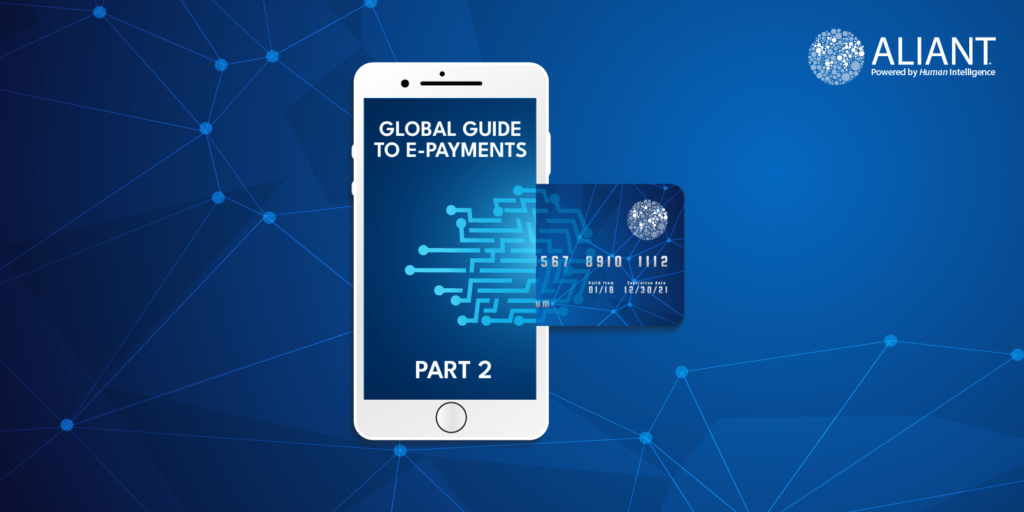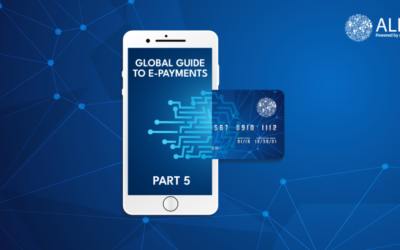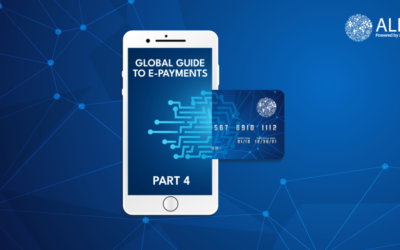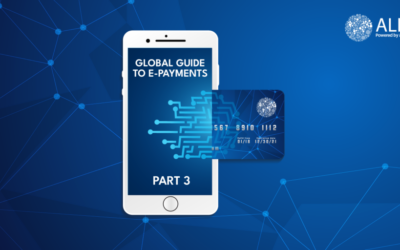Introduction on Global E-Payments Guide by Aliant Corporate PAG.
Global E-payments Guide was created by Aliant’s Corporate Practice Group, where our experienced and well established lawyers from France, Italy, the Netherlands, Finland, Cyprus, U.K, Israel, U.S.A and China have answered some fundamental and up-to-date questions on E-payments. If you are interested in E-payments in any of the beforementioned countries please follow this five part series.
What do we mean by e-payments?
By “E-payments” (also called digital payments), we mean any payment for a good or service without the use of cash, made electronically, i.e. telematically or by internet, using an electronic device (from the traditional payment cards to computers, smartphones, tablets, smartwatches, as well as the Point Of Sale or “POS”, either contactless or with magnetic stripe reading).
Why are e-payments important?
Even before the pandemic, global digital payments industry has been involved in many innovations, including mobile wallets, P2P mobile payments, real-time payments and cryptocurrencies. This new, simple-to-use, cashless payment methods have become an appealing alternative for billions of people and attracted many users.
Over the years, China and the United States developed into the world’s leading digital payments markets, but Europe is set to witness the most impressive digital payments growth. However, with social distancing rules in place, more people started embracing contactless payments as a safer way to manage their money in both developed and emerging countries and consumers are increasingly inclined to use E-payments.
From the side of the E-payment service providers, even large players such as Amazon, PayPal, Apple and Facebook are continuously investing in online and mobile payment solutions and the ongoing changes in e-commerce solutions, with the transition from individual separate online shops to integrated platforms, is creating space for new business models and new opportunities for E-payments.
In conclusion, due to fast technological developments and the increasing of consumers attitude to pay products and services by their online banking accounts as well as by E-payments and mobile payments via smartphone applications, the transition to a cashless society is inevitable and irreversible, therefore this sector is very profitable at the present and will remain productive for a long time.
Do you need any help in e-payment market?
If you are an entrepreneur who wants to succeed in the E-payments market, you know that in the era of global e-commerce, after launching your services locally, you have to spread beyond national borders and therefore operate in different countries, often subject to very different rules and policies.
How do you choose where to start an E-payment service or in which country is it preferable to expand a service already successfully launched in your country? Are administrative authorisations and/or specific requirements to operate payment services? Which activities are allowed? Are there public supervisory auditing of the activity?
To help tackle these questions, Aliant presents an overview of the different legal frameworks for payment services around the world which, without being considered exhaustive or as a legal opinion, aims of providing entrepreneurs and investors who operate internationally and who are interested in payment services with a preliminary tool for choosing the markets in which to launch or expand their payment services.
This general information is merely offered on the basis that it is not a substitute for legal advice and we cannot accept any kind of liability incurred in reliance on their content.
Of course, for any in-depth analysis or specific legal assistance in this sector, Aliant’s experts are available to advise and share their global expertise in the field of digital payments.
What are the potential criminal aspects related to abuse of e-payment services in your country (such as e.g., cyber fraud, money laundering, etc.)?
EUROPEAN UNION (EU)
Innovative methods for electronic cross-border funds transfer are emerging globally. These new payment tools include extensions of established payment systems as well as new payment methods that are substantially different from traditional transactions. New payment methods raise potential concerns in relation to money laundering and terrorist financing because criminals can adjust quickly to exploit new opportunities.
Money laundering in Italy and in the rest of Europe is a growing problem. Laundering funds is a concern because of the prevalence of homegrown organized crime groups and the recent influx of criminal organizations from abroad.
Money laundering occurs both in the regular banking sector and, more frequently, in the non-bank financial system, i.e., casinos, money transfer houses and the gold market. Money launderers predominantly use non-bank financial institutions for the illicit export of currency – primarily U.S. dollars and Euros – to be laundered in offshore companies. There is a substantial black market for smuggled goods in the country.
FRANCE
Innovative digital technologies can pose new risks in terms of money laundering or fraud by hackers adapting very quickly to these new instruments. The opacity of certain instruments (eg electronic money), favouring anonymity, is thus likely to be used for money laundering purposes.
The subject is taken seriously by the French authorities.
Thus, companies were sanctioned in 2021 for the weakness of their internal procedures for the fight against money laundering and the financing of terrorism. The Prudential Control and Resolution Authority (in French «ACPR») criticized the lack of identification of a large number of portfolios, or a risk classification insufficiently suited to the activity.
ITALY
Potential criminal aspects related to e-payment in Italy are substantially the same as those highlighted for the European Union.
The NETHERLANDS
Money laundering is described – simply stated – in article 420bis Sr as the concealment of the origin of objects, or the acquisition, possession, transfer or use of objects with the knowledge that they originate directly or indirectly from any crime.
Since September 1, 2006, the Computer Crime Act II in effect. This enshrines punishable behaviour in the Dutch Criminal Code (Sr) and the investigative powers in the Code of Criminal Procedure (Sv).
The Criminal Code determines in which cases people or legal entities can be punished imposed. Among other things, the Criminal Code states the following behaviour as punishable for cybercrime:
- intruding into an automated work (Computer trespassing) (art. 138ab, paragraph 1);
- penetrating an automated work and subsequently copying data (art. 138ab, paragraph 2);
- penetrating an automated work via a public telecommunications network and then on hacking (art. 138ab, paragraph 3);
- obstructing access to an automated work (art. 138b).
Abuse of e-payment services can fall under cybercrime.
FINLAND
With payments being made online there are certain risks that come with it. The threats to the user include at least fraud and identity theft. When your personal information is handled or processed online even when secured by the service provider, there is still cases in which criminals are stealing user data for illegal use using different types of hacking techniques. There is also the possibility of fraudulent activity by Internet users pretending to operate an e-payment service in order to scam funds from consumers.
In a larger scale, the criminal threats concerning e-payments are money laundering and terrorist financing. Banks have measures against this and have to monitor client activity. However, sometimes illegal activity is still left undetected, or the service providers are not acting according to their duty. For example, in 2020 it was detected that suspicious money transfers worth approx. 150 million had been done via online systems of a Finnish banking group and the transfers had not been reported to the authorities accordingly.
CYPRUS
Innovative methods for electronic cross-border funds transfer are emerging globally. These new payment tools include extensions of established payment systems as well as new payment methods that are substantially different from traditional transactions.
New payment methods raise potential concerns in relation to money laundering and terrorist financing because criminals can adjust quickly to exploit new opportunities. The ease of moving e-money is convenient for both legitimate and illegitimate purposes including money laundering through e-money.
Other forms of cyberattacks faced by e-payment service organisations include, among others, Phishing, Distributed Denial of Service (DDoS), exploits of vulnerability and spam as the main attack vectors.
UNITED KINGDOM (UK)
The ease of moving e-money is convenient for both legitimate and illegitimate purposes including money laundering through e-money. Electronic money and payment institutions are set to benefit from the UK’s new money laundering legislation. The Financial Services Act 2021 (FSA 2021) received royal assent on 29 April 2021. The Act concerns the UK’s financial services legislative framework and starts to look at how the UK will regulate financial services outside of the EU. The FSA 2021, which makes some changes to existing money laundering laws, forms part of a wider agenda envisaged by the UK government. The FSA 2021 includes changes to the money laundering provisions of the Proceeds of Crime Act 2002 to put e-money and payment institutions on the same footing as deposit-takers when using exceptions to specific offences, and amending relevant provisions about the forfeiture of money to apply also to money held in accounts with e-money or payment institutions. The FSA 2021 extends also application of money laundering regulations to overseas trustees.
Other forms of cyberattacks faced by e-payment service organisations include, among others, Phishing, Distributed Denial of Service (DDoS), exploits of vulnerability and spam as the main attack vectors.
ISRAEL
There are no specific potential criminal aspects related to abuse of e-payment services that are unique to Israel.
However, the “regular” criminal offences will apply in the same manner, to the abuse of e-payment services.
UNITED STATES OF AMERICA (USA)
At the U.S. federal level, the Bank Secrecy Act is the primary driver of the U.S. AML legislation. The BSA requires the establishment of robust AML compliance programmes and various reporting requirements, such as suspicious activity reports. The BSA applies to financial institutions, which includes money service businesses, such as e-payment providers and online lenders. Money services businesses are also required to register with FinCEN that imposes its own requirements intended to combat financial crimes.
Cybersecurity for financial market participants is a top concern for U.S. regulators. Federal financial regulators established a plethora of customer data and IT security rules, examination manuals, handbooks and other guidance. Many states, most notably New York, also require money transmitters to comply with state-level cybercrime laws.
CHINA
These aspects may include money laundering, cyber fraud which may be two major concerns these days as e-payment is developed.
Money Laundering
According to the Law on Anti-money Laundering of the People’s Republic of China (PRC), “Anti-money laundering” defined in this Law refers to is to prevent money laundering activities that are armed to cover up, hide the source and nature of incomes and earnings related to drug crimes, organized crime of mafias, crime of terrorist activities, smuggling crime, crimes of corruption and bribery, embezzlement, crimes of disrupting financial management order, crime of financial fraud. To fight money laundering, relevant measures are taken in accordance with the provisions of the Law.
Nowadays, these money laundering activities may be carried out on the internet. So “financial institutions” have the responsibility to fight money laundering on the internet as well. In the Law on Anti-money Laundering of PRC, the term “financial institutions” refers to a lawfully established in the financial business of policy banks, commercial banks, credit cooperatives, postal remittance storage mechanism, trust investment companies, securities companies, futures brokerage companies, insurance companies and other institutions engaged in financial business determined and published by the administrative department for anti-money laundering under the State Council.
Besides “financial institutions”, “non-financial institutions”, such as the payment institutions defined in the Measures and the Detailed Rules for the Measures shall also have the responsibility to fight money laundering. Payment institutions shall not handle the transfer of monetary funds between banking financial institutions, except with special permission. According to the Law on Anti-money Laundering of PRC, the scope of the specific non-financial institutions that should fulfil the obligations of anti-money laundering, the specific measures for their performance of the obligations of anti-money laundering and their supervision and management shall be formulated by the competent administrative department for anti-money laundering under the State Council jointly with the relevant departments under the State Council.
According to in the Measures and the Detailed Rules for the Measures, the examination materials for anti-money laundering measures refer to reports that include the following:
- Documents of anti-money laundering internal control system, including anti-money laundering compliance management framework, customer identification and data preservation measures, and suspicious transaction reporting measures implementation, transaction record keeping measures, anti-money laundering audit and training measures, internal procedures to assist anti-money laundering investigations, anti-money laundering confidentiality measures.
- Anti-money laundering post setting and duty description, indicating the internal organization responsible for anti-money laundering, senior anti-money laundering management personnel and full-time anti-money laundering staff members and their contact information.
- Technical specifications for suspicious transaction monitoring.
Cyber Fraud
According to the draft of the Law Against Telecommunications and Network Fraud of PRC, which was published for opinion on October 23, 2021, the term “telecom network fraud” defined in the Law refers to the activities of defrauding property of public or private through remote and non-contact means, namely by means of telephone, short message, internet, and other telecommunication network technologies for the purpose of illegal possession of the property of public or private. After it is adopted and effective, this Law is applicable to cracking down on and controlling telecommunications and network fraud activities within the territory of PRC or telecommunications and network fraud activities committed by citizens of PRC abroad. Organizations and individuals outside PRC that commit telecommunications and network fraud within PRC or provide products and services for others to commit telecommunications and network fraud, thus harming the interests of the country or citizens of PRC, may be dealt with, and investigated for responsibility in accordance with the relevant provisions of this Law.
There are stipulations to fight Against Telecommunications and Network Fraud, such as follows:
According to the Law, when a banking financial institution or a non-bank payment institution (such as payment institutions) opens a bank account or a payment account for a customer, it shall establish a customer due diligence system, identify and verify the identity of the customer, understand the purpose of opening an account and the risk status, and take appropriate risk management measures to prevent the bank account or payment account from being used for telecom network fraud. During the existence of the business relationship with the customer, banking financial institutions and non-bank payment institutions shall continue to pay attention to and review the customer’s status and transaction status, understand the risk of the customer using the account for money laundering, timely take appropriate due diligence and risk management measures according to the risk status, and identify the beneficial owner according to law.
When an Internet service provider signs an agreement or confirms to provide service to a user, it shall require users to provide their authentic identity information according to law, and service providers shall not provide the following related services if users fail to provide their authentic identity information : (1) Provide network access services; (2) provide network address conversion services such as virtual private network and network proxy; (2) provide internet domain name registration, hosting, space renting, cloud services and content distribution services; (3) provide information, application and software distribution services, or provide instant messaging, online payment, online transaction, online games, online live broadcasting and advertising promotion services.
Is it possible in your country to provide e-payment services immediately and without constraints or one needs to obtain licenses and / or authorizations? Do operators have to comply with technical and / or corporate requirements?
EUROPEAN UNION (EU)*
With few minor exceptions, e-payment services can be provided within EU only by a payment service provider (PSP, a legal person such as credit institutions, electronic money institutions, post office giro institutions, payment institutions, the European Central Bank – ECB and national central banks or Member States or their regional or local authorities when not acting in their capacity as public authorities, or a natural or legal person benefiting from an exemption pursuant to Article 32 or 33) that has been granted authorisation to provide and execute payment services throughout the Union.
Moreover, any authorised PSP can provide payment services in a Member State other than its home Member State, in the exercise of the right of establishment or the freedom to provide services, upon notice to the competent authorities in its home Member State.
There are specific corporate requirements established for PSP contained in the set of information that must be supplied together with the applications for authorization, as well as other following requirements relating to control of the shareholding, initial capital, own funds.
* In order to create a single payment area where European citizens and businesses have easy access to safe cross-border payments with the same charges and the same rules the EU adopted in 2007 the first payment services directive (the so-called PSD1) applicable inside the European Economic Area to all payments executed in other way that cash, electronic payments included, establishing the rights and obligations related to this kind of services as well as the set of information that operators must give to users, and introducing a new figure of financial intermediary (payment institutions) allowed to provide payment services in competition with banks.
A new directive on payment services has been adopted in 2015 and became applicable starting from 2018 (the so-called PSD2) with the aim to improve the first set of rules and include new digital payment services, such as mobile and internet payment services, preserving consumers from frauds and abuses.
FRANCE
According to the French Monetary and Financial Code, only the providers mentioned below can provide payment services, in particular electronic, as a usual profession:
- credit institutions;
- payment institutions (the only ones authorized to also provide the payment initiation service);
- electronic money institutions;
- account information service providers.
Each of these service providers must obtain approval or be registered by the Prudential Control and Resolution Authority (Autorité de contrôle prudentiel et de resolution – ACPR) under the conditions indicated below.
The conditions for obtaining such approvals / registration can be found at this address: https://acpr.banque-france.fr/autoriser/procedures-secteur-banque/agrement-autorisation-ou-enregistrement.
Corporate and technical requirements are required and vary depending on the service provider. It may be required, in particular:
- an adequacy of the legal form to the envisaged activity;
- effective managers with the requirements of good repute, knowledge, experience, and skills,
- a central administration located in the same national territory as the registered office;
- sufficient initial capital and the level of prudential capital regarding capital requirements,
- the activity program and technical and financial resources implemented,
- taking out professional liability insurance;
- the means implemented to ensure the security of means of payment and general organization of security, control of proper functioning and fight against fraud.
The ACPR grants its approvals within 3 to 6 months of receipt of the complete file. For the account information service providers, registration is accepted if the ACPR does not respond within three months. In some cases, the European Central Bank or the Bank of France must issue an opinion before the ACPR renders its decision.
Exemptions from approvals may be requested. This is particularly the case if the payment service is used for a limited range of goods or services, or on company premises or in a limited network of people.
These exemptions can be requested from the ACPR. Companies benefiting from the exemption, unlike authorized players, are not subject to the rules relating to:
- the protection of users of payment services;
- protection of the funds of users of payment services and holders of electronic money;
- obligations relating to AML-CFT.
To protect the users of their services, the ACPR recommends that companies benefiting from an exemption:
- to isolate the funds received on behalf of users in a dedicated account;
- to explicitly mention in their general conditions the regulatory framework in which they operate.
Once approved, these service providers are registered on the Register of Financial Agents accessible at this url: www.regafi.fr.
ITALY
According to the European rules that allows only to PSPs as defined in the PSD2 to provide e-payment services, Italy has transposed the same conditions relating to authorizations and requirements for legally operating within the national borders: the Consolidated Law on Banking (TUB) exactly establishes what subjects are entitled to provide payment services and ancillary activities, and designates the Bank of Italy as the entity legitimated to release authorizations to those subjects in possession of the necessary requirements as well as to keep the national register of payment institutions.
PSPs must comply both with technical and corporate requirements as established in the Consolidated Law on Banking and in the Supervisory provisions for Payment institutions and Electronic Money Institutions of Bank of Italy, such as aspects relating to the legal form, the location of the registered office, the capital amount, the eligibility of directors and others. Italian PSPs may establish branches in the territory of the Republic and other Member States in compliance with the procedures established by the Bank of Italy, and EU PSPs may establish branches in the territory of the Republic.
The NETHERLANDS
It is prohibited to conduct the business of a payment service provider without a license from DNB. The prohibition is included in Section 2:3a of the Financial Supervision Act (Wft). The licensing requirement and supervision of payment service providers is based on the European Payment Services Directive (2007/64/EC).
The prohibition relates to services to payment service users whereby the payment service provider for or to customers: operates payment accounts, transfers money, deposits or withdraws money, and/or payment instruments are issued or accepted. This always concerns services to clients who are also end-users. That is, services provided to the payer and/or the payee. The payment service provider plays an intermediary role in this.
FINLAND
E-payment services or any payment services can be provided in Finland only by authorised payment institutions or entities. However, there is an exception to the requirement of authorisation. Payment services, other than ones for the provision of issue of electronic money, can be provided without an authorisation, if total value of completed transactions by natural persons does not exceed an average of EUR 50,000 a month over a period of 12 months. For legal persons, the maximum amount is an average of EUR 3 million a month. The Finnish Financial Supervisory Authority (FSA) must be still notified before beginning provision of the service. The service provider must have its head office in Finland and a permanent place of business. A natural person cannot be authorised as a payment institute. Shareholders and founders must be deemed reliable to get authorisation for the provider. A payment institution shall record, in a reliable manner, the business transactions relating to electronic money or other payment services. The payment institution must establish an efficient risk management system. At least 75% of the Tier 1 capital shall be Common Equity.
CYPRUS
With few minor exceptions, e-payment services can be provided within EU only by a payment service provider (PSP, a legal person such as credit institutions, electronic money institutions, post office giro institutions, payment institutions, the ECB and national central banks or Member States or their regional or local authorities when not acting in their capacity as public authorities, or a natural or legal person benefiting from an exemption pursuant to Article 32 or 33) that has been granted authorisation to provide and execute payment services throughout the Union. So, the norm is that prior authorisation is required (art. 11 of the PS Law).
Moreover, any authorised PSP in Cyprus can provide payment services in a Member State other than its home Member State (Cyprus), in the exercise of the right of establishment or the freedom to provide services, upon notice to the competent authorities in its home Member State.
There are specific corporate requirements established for PSP contained in the set of information that must be supplied together with the applications for authorization, as well as other following requirements relating to control of the shareholding, initial capital, own funds.
In addition, the PS Law requires that the payment institutions which provide payment services as referred to in points (1) to (6) of Annex I (see answer 3 below) to safeguard all funds which have been received from the payment service users or through another payment service provider for the execution of payment transactions, in either of the following ways:
(a) The funds shall not be commingled at any time with the funds of any natural or legal person other than payment service users on whose behalf the funds are held and, where they are still held by the payment institution and not yet delivered to the payee or transferred to another payment service provider by the end of the business day following the day when the funds have been received, they shall thereafter be deposited in a separate account in a credit institution or invested in secure, liquid low-risk assets as defined by the Central Bank by issuing directives and in the interest of the payment service users against the claims of other creditors of the payment institution, in particular in the event of insolvency;
(b) Funds shall be covered by an insurance policy or some other comparable guarantee from an insurance company or a credit institution, which does not belong to the same group as the payment institution itself, for an amount equivalent to that which would have been segregated in the absence of the insurance policy or other comparable guarantee, payable in the event that the payment institution is unable to meet its financial obligations.
Where a payment institution is required to safeguard funds under paragraph 1 and a portion of those funds is to be used for future payment transactions with the remaining amount to be used for non-payment services, that portion of the funds to be used for future payment transactions shall also be subject to the requirements under subsection (1).
Where under subsection (2) portion of funds is variable or unknown in advance, the Central Bank of Cyprus may allow payment institutions to apply subsection (2) on the basis of a representative portion assumed to be used for payment services provided such a representative portion can be reasonably estimated on the basis of historical data to the satisfaction of the Central Bank of Cyprus.
UNITED KINGDOM (UK)
The Payment Services Regulations 2017 (PSR 2017) establishes a class of firms authorised or registered to provide payment services collectively referred to as PSPs in this document.
The following types of firms will require authorisation or registration for their payment services activities, amongst others:
- money remitters
- certain electronic communication network operators offering payment services
- non-bank credit card issuers
- merchant acquiring firms
- payment initiation service providers
- account information service providers
PSPs must comply with strict conduct requirements and provide information that allows the accurate regulation of the business. Accordingly, a PSP must:
- be registered or authorised, unless exempt
- meet the conduct of business requirements of the PSR 2017
- provide annual reporting information, for example, details of the value of payment transactions
- notification of any changes in the firm, for example, if it wants to vary the payment services it provides
- ensure that its customers’ payments are secure and safe
When applying for authorisation or registration, an E-money PSP firm must provide:
- what e-money services and payment services it wants to provide
- a business plan of who is responsible for providing the services, for example a manager or an agent on its behalf
- details of any person or firm with 10% or more of the capital or voting rights in your firm
The same type of requirements apply to PSPs generally.
ISRAEL
There are a number of e-payment services offered in Israel some are related to the banking industry, some are related to the credit card companies and some are independent.
The Supervision of Financial Services Law states that the Finance Minister will appoint a supervisor that will be in charge of giving licenses to e-payment services providers. (Paragraph 2)
The law also gives a list of criterions by which the supervisor should take into consideration. These criterions are as a general rule are to:
- Provide a reliable, safe and stable financial environment for providing such financial services;
- Protecting the clients;
- Increasing accessibility to these financial services;
- Promoting competition;
- Encouraging innovation; (Paragraph 3)
According to the law there is a registry of all types of e-payment services providers (Paragraph 4). No one is allowed to provide such services without a license (Paragraph 12). A basic license will be provided to any individual that does not have a criminal record and has the minimal equity capital (Paragraph 15). An extended license will be provided to a corporation that meets the conditions needed for a basic license and while the supervisor (who is the license provider) must also take into account the applicant’s business plan, his financial ability and sources and the good of the public.
Besides the aforementioned, the regulations state that an e-payment services provider that wants to join the operator (either directly or by joining a direct user) must: (1) Have legal authority to operate in the name of the people that he is providing the service to. (2) Follow the operator’s rules. (3) Sign a contract with the operator.
It is also important to mention that according to Paragraph 7D of the Banking Law it is forbidden for a bank to prevent another financial institution from providing clients with credit cards. Thus there is strong protection to e-payment services providers.
UNITED STATES of AMERICA (USA)
All e-payment service providers are subject to extensive licensing under federal law, and under the laws of every state where they will operate.
The licensing requirements are very cumbersome and expensive to comply with and serve as a significant deterrent for any new operator.
On top of the e-payments laws and regulations, because all financial transactions in the United States run through fintech businesses, these businesses are subject to a myriad of federal and state regulatory and licensing requirements.
At the federal level, fintech firms come under the jurisdiction of the Consumer Financial Protection Bureau and some under the jurisdiction of the Securities and Exchange Commission and/or the U.S. Department of Treasury’s Financial Crimes Enforcement Network. Businesses that are required to register with FinCEN must comply with the Bank Secrecy Act and various AML rules and regulations.
Many fintech firms in the United States also need to seek licensing and registration in every single state that they operate in. At the end of 2020, 29 states have signed on to a multistate money services business licensing agreement, which streamlines the money transmitter licensing process.
CHINA
Non-financial Institutions are not allowed to provide e-payment services immediately without constraints. They must obtain licenses and / or authorizations from the People’s Bank of China (PBC) for providing e-payment services.
According to the Measures and the Detailed Rules for the Measures, a non-financial institution shall obtain a Payment Business Permit according to the Measures and the Detailed Rules for the Measures, and become a payment institution, so it may be allowed to provide payment services.
Payment institutions shall be subject to the supervision and administration by the People’s Bank of China (PBC). NO non-financial institution or individual may directly or indirectly engage in the payment business unless it has been so approved by the People’s Bank of China (PBC).
Non-financial Institutions have to comply with technical and / or corporate requirements stipulated in the Measures and the Detailed Rules for the Measures, and other relevant laws and regulations, such as the Law for E-commerce of PRC, the Law for Cyber Security of PRC, the Law for Data Security of PRC, the Law for Protection of Personal Data of PRC.
Please follow these series for Part III where we will discuss framework of E-payments service contracts and the information E-payment services must provide to its customers.
If you would like to read the entire Global Guide on E-Payments, you can download it here .
Follow us on LinkedIn.






